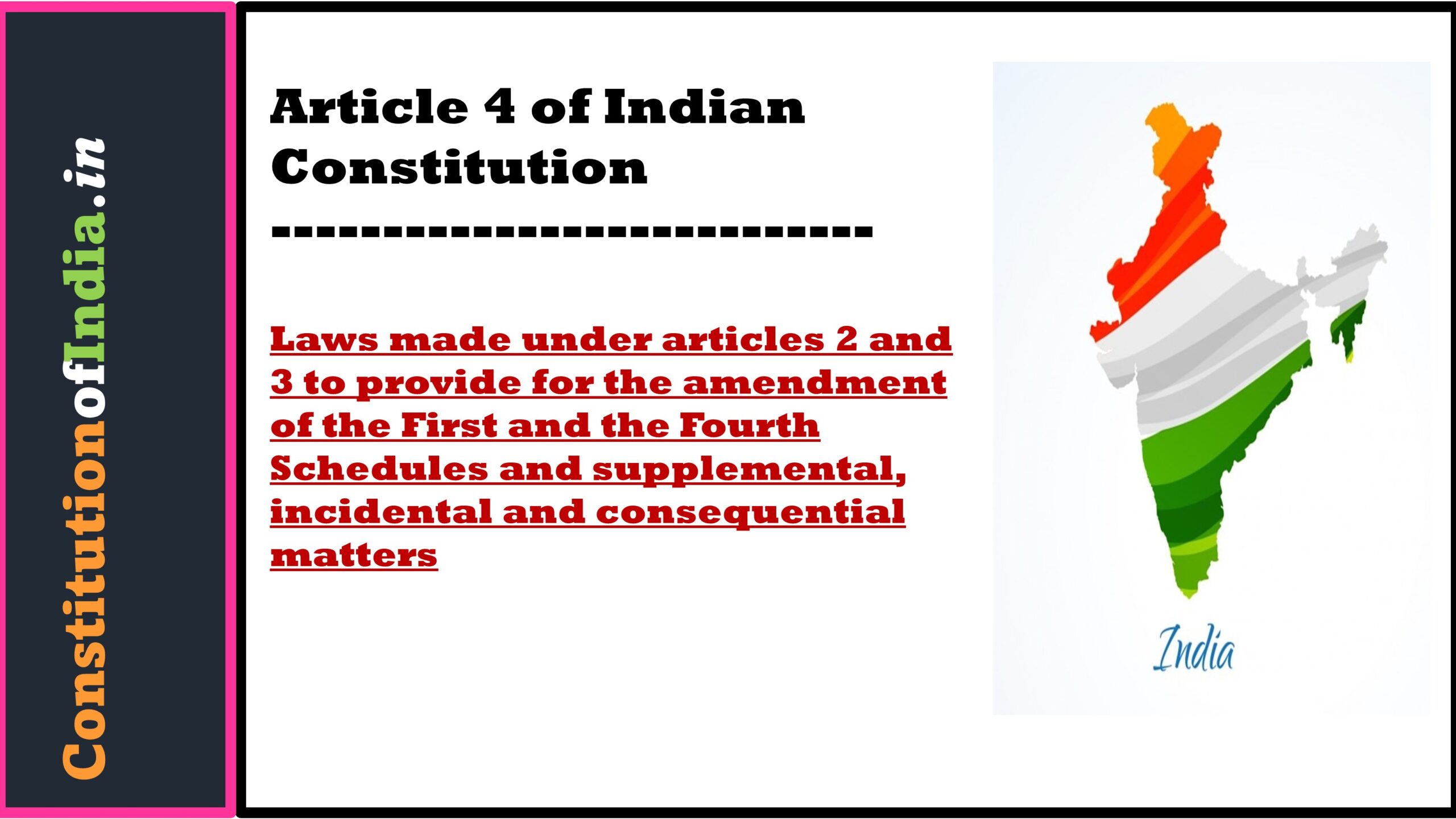Article 4 of Indian Constitution: Laws made under articles 2 and 3 to provide for the amendment of the First and the Fourth Schedules and supplemental, incidental and consequential matters.

Laws made under articles 2 and 3 to provide for the amendment of the First and the Fourth Schedules and supplemental, incidental and consequential matters – Constitution Of India.
1.Any law referred to in article 2 or article 3 shall contain such provisions for the amendment of the First Schedule and the Fourth Schedule as may be necessary to give effect to the provisions of the law and may also contain such supplemental, incidental and consequential provisions (including provisions as to representation in Parliament and in the Legislature or Legislatures of the State or States affected by such law) as Parliament may deem necessary.
2. No such law as aforesaid shall be deemed to be an amendment of this Constitution for the purposes of article 368.
Summary on Article 4 of the Indian Constitution
| Summary Article 4 of the Indian Constitution |
|---|
| 1. When new states are being formed or existing ones are being changed, the law passed for it should include rules for updating the list of states and seats in the Parliament and State Legislatures. It can also include other necessary rules. |
| 2. This law, even though it’s important for making these changes, won’t be considered as a formal change to the Constitution itself as per Article 368. |
More points on Article 4 of the Indian Constitution
| Point | Description |
|---|---|
| Article 4 Purpose | Facilitates the implementation of changes in the 1st and 4th schedules, specifically related to states and Rajya Sabha seats. |
| Amendment Process | Any changes to the schedules must be approved by a simple majority in the Indian Parliament. |
| Changes in 1st and 4th Schedules | The 1st schedule involves altering state names, while the 4th schedule deals with the allocation of Rajya Sabha seats for each state. |
| Interrelation with Articles 2 and 3 | Article 4 is closely linked to Articles 2 and 3, ensuring that the legislature of states mentioned in those articles is implemented when necessary. |
| Significance | Article 4 plays a critical role in the legal framework governing changes to states and territories, including state name changes and Rajya Sabha seat allocations. |
| Core Purpose | The core purpose of Article 4 is to enable the effective implementation of changes specified in Articles 2 and 3, with approval by a simple majority vote. |
FAQs on Article 4 of the Indian Constitution
Q1: What is Article 4 of the Indian Constitution about?
A1: Article 4 of the Indian Constitution deals with the power of the Parliament to make laws for the formation of new states and alteration of areas, boundaries, or names of existing states.
Q2: What is the purpose of Article 4?
A2: The purpose of Article 4 is to provide the Parliament with the authority to enact laws related to the formation, alteration, or naming of states in India.
Q3: What powers are granted to the Parliament under Article 4?
A3: Article 4 grants the Parliament the power to:
- Create new states within the Indian Union.
- Increase or decrease the areas, boundaries, or names of existing states.
Q4: Does Article 4 require the consent of the affected states for the formation or alteration of states?
A4: Yes, Article 4 mandates that the consent of the affected states be obtained for the formation or alteration of states. The state legislatures of the affected states need to provide their consent for such changes.
Q5: How is the consent of the affected states obtained under Article 4?
A5: The President of India seeks a proposal from the concerned state legislature(s) and refers it to the Parliament. The proposal is then discussed and approved by both houses of Parliament. If approved, the President gives his/her assent, and the new state or alteration comes into effect.
Q6: Are there any limitations or conditions specified in Article 4 for the formation or alteration of states?
A6: Article 4 places limitations and conditions on the formation or alteration of states, such as considering the consent of the affected state legislatures and ensuring the integrity and security of India.
Q7: Can the Parliament unilaterally alter the areas or boundaries of states?
A7: No, the Parliament cannot unilaterally alter the areas or boundaries of states. The consent of the affected state legislatures is required for any such alterations.
Q8: Can Article 4 be amended?
A8: Yes, Article 4 can be amended through the constitutional amendment process, which requires the approval of both houses of Parliament and ratification by the majority of state legislatures. However, any amendments should be consistent with the principles of federalism and the interests of the affected states.
Q9: Has Article 4 been used in the past to alter the boundaries of states?
A9: Yes, Article 4 has been utilized in the past to alter the boundaries of states in India. Some examples include the reorganization of states and changes in state boundaries to accommodate the demands of various regions.
Q10: Are there any legal challenges to the exercise of power under Article 4?
A10: There have been instances where the exercise of power under Article 4 has faced legal challenges, particularly concerning the validity of the consent obtained or the manner in which alterations were carried out. These challenges are dealt with by the judiciary, which ensures adherence to constitutional provisions and principles.